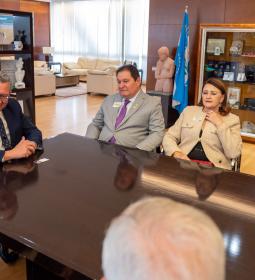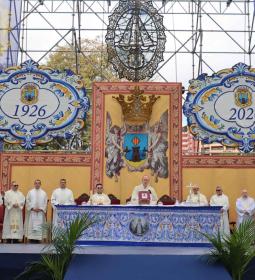The mayor, Toni Pérez, exposes the actions carried out around sustainability, accessibility, innovation and technology
The urban resilience of Benidorm and its steps towards the DTI, protagonists in the Smart Cities Congress of Valencia

The steps being taken by Benidorm to become the world's first certified intelligent tourist destination and the Urban Resilience project in which the City Council and the Dinapsis Operation & Lab work hand in hand have had a prominent place in the Smart Cities Congress for Smart Citizens of Valencia. A congress organized by the Association of Companies with Activities linked to the Energy Sector in the Valencian Community (Avaesen) and in which the mayor, Toni Pérez, has participated. Specifically, the mayor has intervened in a round table entitled 'Regulations on the development of Smart Cities' with the councilor of Smart City of Alcoy, Manuel Gomicia, and the coordinator of this department at the City Council of Rafaelbunyol, Marta Fenollosa.
Before a hundred attendees, the mayor has outlined the axes established by the UNE 178501 standard for the Management of Smart Tourist Destinations, which governs the conditions that must be met by cities that make the leap towards intelligent management in the field of tourism. Pérez has indicated that three years ago - when Benidorm launched its 2015-2020 Master Plan - it is actively and decisively developing actions linked to these strategic axes: sustainability, accessibility, innovation and technology "to put them at service of citizens ", whether residents or tourists, improving their quality of life.
During his presentation, the mayor referred to the actions undertaken in terms of governance, such as the implementation of Electronic Administration improving the services of the Treasury area of the City Council or the own Urban Resilience project of Benidorm, which has previously explained in detail the director of Dinapsis, Jorge Ballesta. A project, Perez recalled, which aims to "prevent and resolve more quickly and effectively any incident that affects the normal functioning of the city" and, consequently, the daily life of citizens.
Pérez has had an impact on the progress made in terms of sustainability, such as the drafting and approval two years ago of the Sustainable Urban Mobility Plan (SUMP); or the decided commitment to "accessibility", a field "in which we were pioneers decades ago with the creation of accessible beach spots, a model that has been replicated later in numerous destinations". That bet, he said, permeates the municipal action and has been recently consolidated with the creation of the Universal Accessibility department; and it is also very present in tourism management, taking shape in initiatives such as the elaboration of the first accessible tourist map of the city for people with visual and / or auditory functional diversity.
In his speech, the mayor also mentioned the most significant actions in the fields of innovation and technology developed in close coordination with the Visit Benidorm Foundation. Thus, it has highlighted the creation of its own network of free Wi-Fi on the beaches; or the implementation of the Booking Books project in collaboration with the hotels in the city.
Pérez highlighted the fact that the Visit Benidorm Foundation was the first to be certified in Tourism Intelligence, Technological Surveillance and Competitive Intelligence, and explained how the application of this tourist intelligence system and the management of Big Data has allowed improving and strengthen the sports tourism segment. He also mentioned the work that is being carried out to capture audiovisual and advertising shoots that allow to move and project the image of Benidorm through the big media.
To end his presentation, Pérez has shown his confidence that "the rules and technology make us fight not for the market, but in a market," and said that "we must take care of what works" and work "with vocation" to implement actions that "improve the lives of citizens, whether they are neighbors or tourists".




